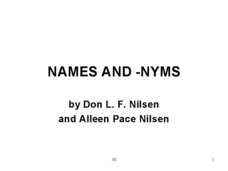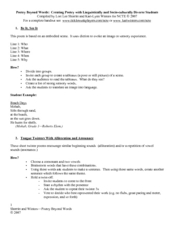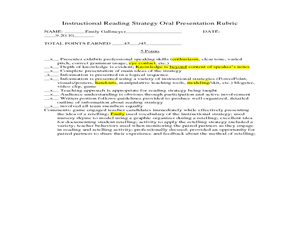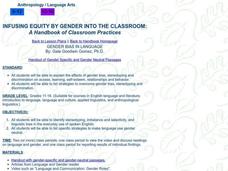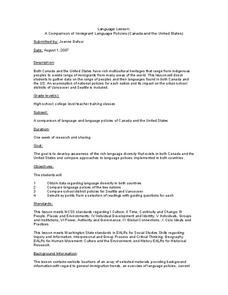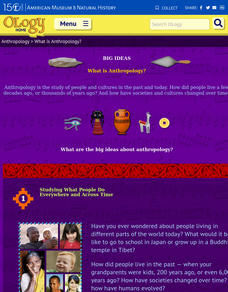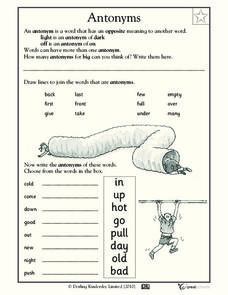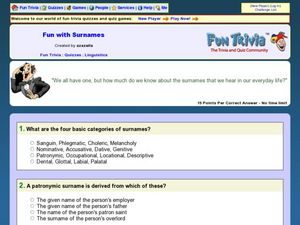Curated OER
Understanding Points of View
Investigate the importance of author's point of view. Young linguists study primary source documents related to the Treaty of Casco Bay. The first source is authored by the Native American Chiefs, the second by an English...
Curated OER
Teaching Social Studies in English
Case studies, an examination of images, and readings of passages from the UN Convention on the Rights of the Child are used to spark conversations in ESL/ELD social studies classes about this highly-charged topic. Using a variety of...
Achieve3000
Discriminating Phonemes 2
Some sounds sound very similar! Help your class learn how to distinguish between various sounds by following the steps outlined in this plan. The plan includes a warm-up, a teacher-led portion, and details for guided and independent...
Ontario
Critical Literacy—Media Texts
Media texts convey both overt and implied messages. As part of their study of media, class members analyze the language, form, techniques, and aesthetics in a variety of media texts.
Curated OER
Word Connections
Students explore the science of word associations. They take a memory quiz, read articles on how the brain processes language, explore the concept of false memories and create and illustrate their own original word associations.
Curated OER
Names and -Nyms
If you are teaching a class about language, this presentation about names and -nyms might be helpful. It is long enough to be broken into several different class sessions and addresses place names, stage names, surnames, and naming...
Curated OER
Irregular Formal Commands
After learning the regular formal commands for the Spanish language, your linguists should learn the irregular formal commands. First, they complete the chart with select irregular verbs like ir, caber, and caer. Then, in the second...
Curated OER
Production of the Four Tones of the Chinese Language
Learners pronounce the four tones of the Chinese language. They play a red light-green light game in which they advance if they say words correctly.
Curated OER
Poetry Beyond Words: Creating Poetry with Linguistically Diverse Students
Models of and directions for how to write 20 different types of poems are featured in an NCTE resource. The introduction to each form highlights the embedded concepts. For example, tongue twisters encourage poets to use alliteration and...
Curated OER
Structure of Natural Narratives
Class pairs select a prompt from a provided list and tell (and record) their story to their partner. They then examine linguist William Labov's model for natural narratives, and apply his model to their tale. Next, class members watch...
Curated OER
Keep Your English Up to Date: Chav
Take a look at linguistics and stereotypes in Great Britian with a word study of "chav." Learners find out what terms are pejoratives and what they are meant to convey. Geared toward British culture, study the ever-changing English...
Curated OER
Retelling
Explore language arts by completing a story worksheet in class. Readers will identify the importance of plot, setting, and character while they write their own short story. They also retell their story to a classmate and participate in a...
Curated OER
Diversity of Languages
Students interpret graphs and statistics to recognise and understand the cultural and linguistic diversity of Australia. They create a profile of the linguistic diversity of the class or school. Students discuss Australia's cultural...
Teach Ling
Problem Solving with Turkish
Conquer those pesky moments when the Turkish language appears in class. Don’t be afraid to discover a few new Turkish morphemes, and their corresponding English words in this quick lesson. Who knows where this knowledge can go?...
Curated OER
What is your language?
First graders read a book and recognize words from the book and write sentences based on the book about language. In this language lesson plan, 1st graders also say yes and no in another language.
Curated OER
Poetry in Music
Sixth graders look at poetry in music. In this language arts lesson, 6th graders listen to and read the lyrics of songs to find the poetic aspects of them. They focus on similes and metaphors and write their own songs lyrics.
Curated OER
A Comparison of Immigrant Language Policies (Canada and the United States)
Students explore the linguistic backgrounds that have shaped the cultural perspectives of Canada and the United States. For this cultural comparison lesson, students create a class presentation that reflects the similarities and...
American Museum of Natural History
What is Anthropology
A colorful resource introduces learners to the four major fields of anthropology: cultural anthropology, linguistic anthropology, biological anthropology, and archaeology. Explanations are provided for what each field studies, the kinds...
Curated OER
Irony
Using examples from Socrates to Johnny Carson, this slideshow presents your students with the history and definition of dramatic irony, satire, situational irony, and tragic irony. This presentation would be useful in a language arts...
Curated OER
Antonyms
Familiarize linguists with antonyms as they examine examples and match up opposites. First, scholars read a short description of antonyms, writing as many antonyms for big as they can. Then, they match up pairs of words that are antonyms...
Curated OER
The ee Sound
When two vowels take a walk, the first one does the talking! Scholars see this motto put to use as they study the /ee/ sound in various spelling patterns. Learners read a short introduction on this concept before reading several example...
Curated OER
Newspaper Unit: Reading Lesson Plan
Work on identifying the different parts of a newspaper with your English learners. After reviewing newspaper terminology, pupils pair up and complete a scavenger hunt, looking for specific things in the newspaper and recording their...
Curated OER
Fun with Surnames: Fun Trivia Quiz
Covering a unit of surnames, linguistics or the history of the English language? Then this might be a great pre-test or sponge activity for you. Test learners' knowledge of how and where certain surnames originated. As with all Fun...







